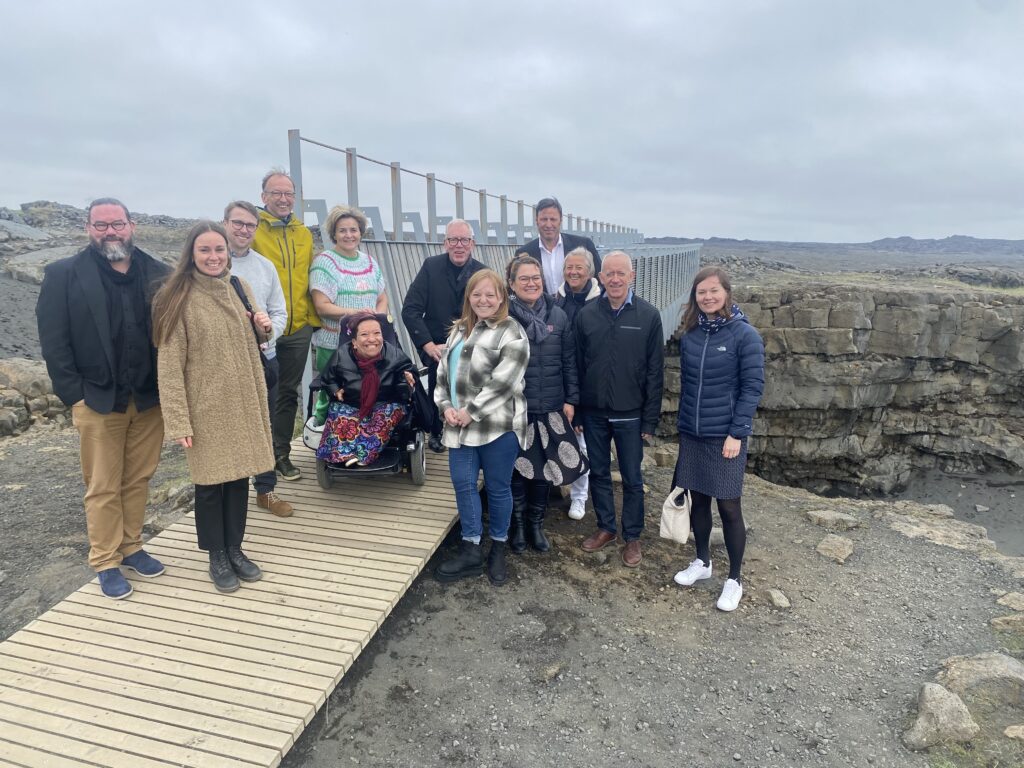Making Iceland more accessible one ramp at a time
Disability issues
9 Aug 2023
Hundreds of new ramps are making shops, offices, and other establishments in Iceland more accessible. An innovative partnership for increasing accessibility was one of the examples the Council of Nordic Cooperation on Disability got to hear more about when meeting in Reykjavik, Iceland in May.
The effect of the initiative Ramp Up Iceland is clearly visible for every Reykjavik visitor who looks down to street level. At the busy pedestrian street Laugavegur, many discreet ramps enable a smooth entrance to pharmacies, shops, tourist information offices and cafés.
Ramp Up Iceland was started by entrepreneur Haraldur þorleifsson, known as Halli. Since the start in 2021 more than 450 ramps have been built, and the goal is set at 1500 ramps by spring 2025. The funds come from private donors, businesses and organisations who want to contribute to better accessibility. Recently Halli also announced plans to expand the initiative to other European countries, starting with the city of Paris, France.
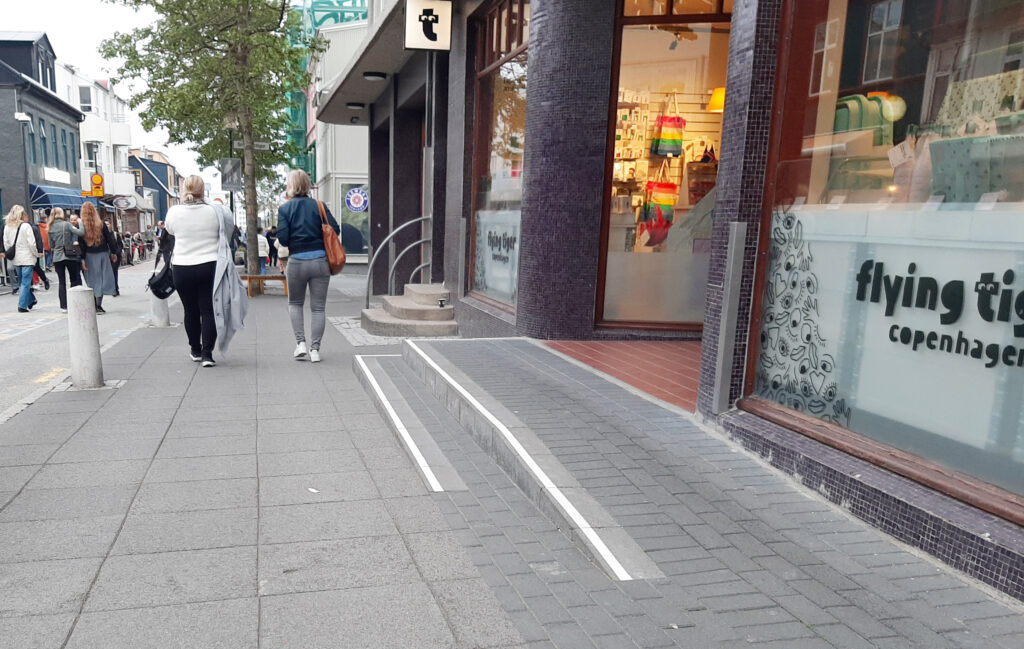
The National Confederation of Physically Disabled People in Iceland, Sjálfsbjörg, is a partner and sponsor to Ramp Up Iceland. The organisation gets to take part in the decision on where new ramps will be built, explains Margrét Lilja Aðalsteinsdóttir, president of Sjálfsbjörg.
– We have engaged and empowered our members all over the country to take part in the project by suggesting where ramps are needed the most, talking to local business owners to try to emphasise the importance of accessibility and getting them to apply for a ramp, says Margrét Lilja Aðalsteinsdóttir who also is a board member of Ramp Up Iceland.
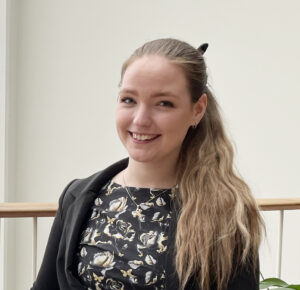
The board makes the final decision, based on the suggestions from the users.
– Local wheelchair users know best of all where ramps are needed in their community, says Margrét Lilja Aðalsteinsdóttir.
“The way of thinking has changed completely”
A wheelchair user herself, Margrét Lilja Aðalsteinsdóttir explains that the change has been big.
– Before, I had to sit and wait outside almost every shop at Laugavegur. The businesses said they couldn’t do anything about the lack of accessibility. Now the way of thinking has changed completely.
Being a part of Ramp Up has been a positive experience for the disability organisation Sjálfsbjörg.
– There have been very few problems, because getting ramps is such a positive thing. The quest for better accessibility is often negative, with us pointing out what needs to be changed. It’s about time we highlight the positive aspects, says Margrét Lilja Aðalsteinsdóttir.
A more accessible businesses can get more customers.
– Businesses can make money from being accessible. And people with disabilities want to be part of society – when we point that out in a positive way, many more want to contribute to better accessibility, says Margrét Lilja Aðalsteinsdóttir.
Co-creating accessible services by involving the users
In Reykjavik, The Council of Nordic Cooperation on Disability visited Iceland’s National Association of People with Intellectual Disabilities Throskahjalp and the Icelandic Disability Alliance ÖBI to hear about innovations in the field of disability services, accessibility, and inclusion.
– People with disabilities need to be involved when new technologies are being developed, says Anna Lára Steindal, Project Manager at Throskahjalp.
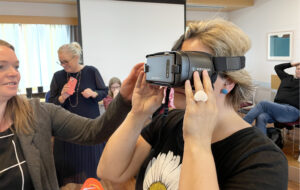
Throskahjalp shared experiences on how to broaden the discussion on accessibility, from targeting only authorities to involving a broader range of stakeholders, such as employer organisations and educational institutions. The members of the Disability Council also got to experience hands-on ways to increase accessibility, such as magnifying goggles and floor markings that help visually impaired.
The Disability Council held its formal meeting at the Icelandic Ministry of Social Affairs and Labour. Guðmundur Ingi Guðbrandsson, Minister of Social Affairs and the Labour Market highlighted what the Icelandic government is doing to increase accessibility and inclusion.
– A socially sustainable Nordic region is one where universal design, accessibility, and inclusion are central perspectives, says Guðmundur Ingi Guðbrandsson.
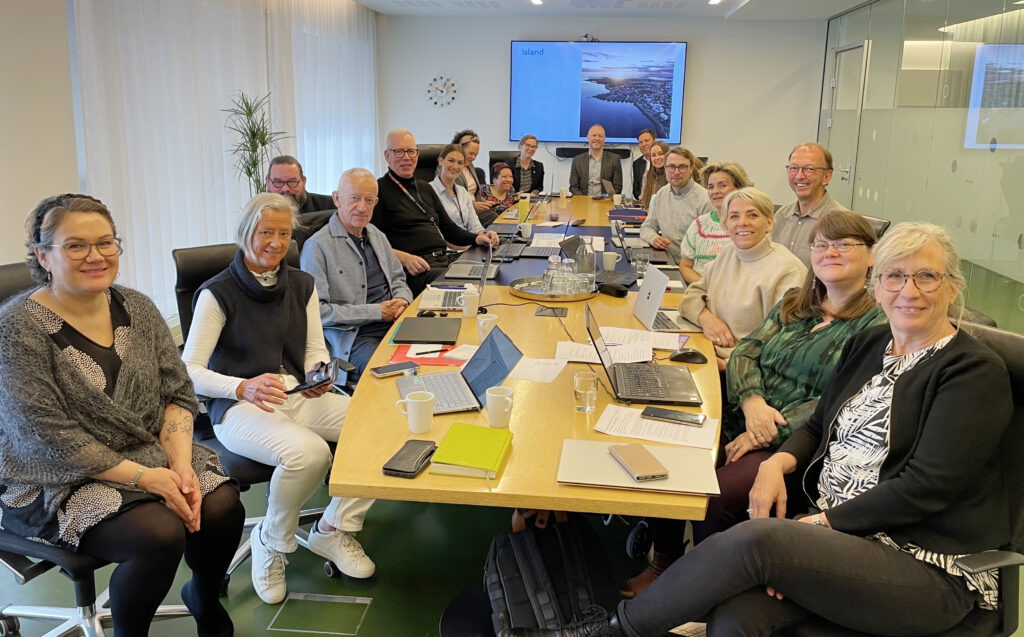
Universal design in buildings
At the Icelandic Disability Alliance ÖBI, Stefán Vilbergsson introduced a project aiming to improve and increase universal design through cooperation between architects, engineering organisations and the Icelandic housing authority. The goal is to raise awareness of the need for universal design and one way of doing it will be by creating new material with guidelines on universal design.
The ÖBI building itself has several good examples of how a building can be made accessible for all. Director Eva Þengilsdóttir pointed out different accessible solutions, from tactile floor markings to silent, self-opening doors.
Art highlighting unfairness
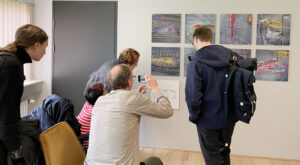
Photographer Hrafn Jónsson, working under his artist name Krummi, presented art with a purpose to display difference in earnings between an artist with and without disability. His photos in the work Bótaþegi, or Bene-Fits, shows jeans patched with colourful thread, combined with numbers showing that if an artist without disability sell a work for 100 000 Icelandic Kronas, the earning after tax will be around 53 000 ISK. An artist with disability will be subject to different taxation, leaving the artist with an earning around 27 000 ISK. The artwork is on display on the ground floor of the Icelandic Disability Alliance ÖBI.
Accessibility all the way out on the lava field
The ruggedly beautiful Icelandic nature with its unique geology is not something that only travelers without disabilities can enjoy. The members of the Council of Nordic Cooperation on Disability experienced the Reykjanes peninsula and visited accessible sights, including the Bridge between Continents, where the Eurasian and North American tectonic plates meet.
